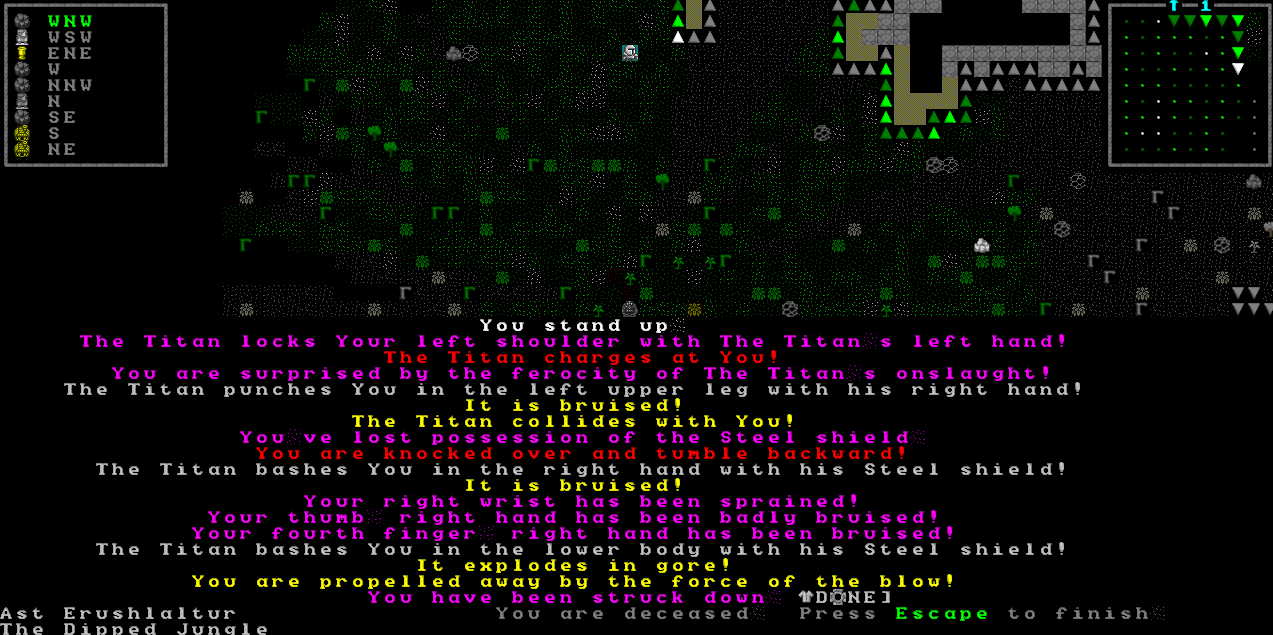wtf, i died in the first fifteen minutes? this game sucks!
Thank you for coming to my D&D game! There's cookies and punch by the door. Now that we're all settled in and pretending to be elves, let's talk about ᴅᴇᴀᴛʜ. |
| I am every single one of these people simultaneously somehow. |
If you read these same threads, you will see that this is a source of friction between people who like old-school games and people who have other aesthetics of play.
For me personally, a game is only exciting if there is some kind of failure state, some possibility that I will not obtain the outcome I desire. As I define/understand it, the existence of a failure state is what separates the concept of the game from that of the toy; toys can be thought of as submitting or being acted upon, while games push back and act upon the player.
 |
| Losing is fun! Dwarf Fortress. |
It's easy to understand how it can feel frustrating to lose a poweful character, even if that loss is in some sense "deserved." Worse still, not only have you lost the hero you have grown attached to, now you have to start again at the very beginning! Losing a lot of low-level characters can also be quite disheartening, especially if other players can still rely on their powerhouses (though I have been working on smoothing out the power curve so that the difference between low and high-levels is not so night and day).
Axiom: RPGs are not really about the characters, but the players.
Corollary: Whatever happens to the characters, the players should feel like they are making progress if they have earned it by overcoming challenges.
I like to try to accomodate lots of people at my table. For some of my players, having a badass story to tell is all the progress they need. Others want more concrete acknowledgement that they put in the time and effort and laughed and cried and bled.
fate points
Fate points (also called actions points, etc.) in RPGs usually take the form of an abstract resource which can be expended to e.g. reroll a save, get an extra attack, or famously in Warhammer Fantasy Roleplay, to simply Not Die. Many people have written about the pitfalls of such fate points: it's inherently a dissociated mechanic; if they can be used to avoid death rational players will only ever use them for that purpose; and so forth.Needless to say, I'm not a fan.
 |
| Pictured: Fate points in most RPGs. Margus Holland. |
I feel like the system guides players towards certain metagame behaviors and understandings that I want to encourage. It's another signpost that death is a common/inevitable occurence, helping players who are perhaps unaccustomed to that to mentally prepare themselves. At the same time, it enables players who had powerful characters to more quickly get back to making grand changes to the shared world. The chargen boosts "for sale" are the sorts of things which feel good without totally negating the riskiness of the game - getting 18 Strength because you saved up for 4d6 drop lowest is cool, but it's not going to carry you. While the system is dissociated (i.e. it doesn't really represent anything within the fiction) character generation itself is a fairly dissociated process to begin with. Finally it encourages players to think beyond their current character, which I feel is an important mindset to have if you want to establish one of those long 20+ year campaigns like I do.
I haven't had any players try to game the system by essentially churning characters for fate points yet. Not only do people tend to get attached to their characters, it seems most people recognize that the rewards really are just there to soften the blow; not at all worth grinding for.
the actual boring rules part
(These are pulled from an old version of my house rules. They haven't been reviewed in awhile, so feel free to criticize/suggest additions! My rules for character generation are: 3d6 in order, reroll one ability score or starting hp, swap two ability scores not rerolled, if the sum of ability mods is less than -1 character may be mulliganed.)Fate points are a resource which allow you to counteract some of the randomness of character generation. They are awarded to you either upon the death or successful retirement of a character. Once fate points have been given for a particular character, that character may never be played again.
One fate point is awarded per level of the character. An additional point is awarded if that character was the first time you played a particular class. Two additional points are given if the character established and controlled a stronghold at the time of death or retirement.
Fate points may be expended to gain mechanical benefits during the character generation process, at the following costs:
| COST | EFFECT |
|---|---|
| 1 | One extra ability score swap. |
| 1 | One extra ability score reroll. |
| 2 | Freely assign ability scores. |
| 3 | Reroll one ability score 4d6 drop lowest. |
| 3 | Start with a loyal 0-level retainer. |
| 4 | Start with maximum 1st level HP. |
| 5 | Double starting money or start with 100 sp, whichever is higher. |
| 5 | Start with half of the experience required for next level. |
| 7 | Roll all ability scores 4d6 drop lowest, in order. |
| 10 | Reroll one ability score 5d6 drop lowest. |
| 12 | Start at second level. |
- kill your dungeon master -
This is pretty nice. I am running a drop-in/out game of The Caverns of Thracia. This would be a good way to reward players who show up consistently, but without changing anything in game. Also promote trying different classes.
ReplyDelete